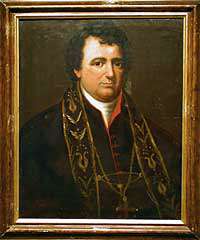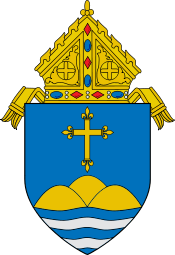Benedict Joseph Fenwick
| The Right Reverend Benedict Joseph Fenwick SJ | |
|---|---|
| Bishop of Boston | |
 | |
| See | Boston |
| Installed | December 3, 1825 |
| Term ended | August 11, 1846 |
| Predecessor | Jean-Louis Lefebvre de Cheverus |
| Successor | John Bernard Fitzpatrick |
| Orders | |
| Ordination |
June 11, 1808 by Leonard Neale |
| Consecration |
November 1, 1825 by Ambrose Maréchal |
| Personal details | |
| Born |
September 3, 1782 Leonardtown, Maryland, United States |
| Died |
August 11, 1846 (aged 63) Boston, Massachusetts, United States |
| Nationality | American |
| Denomination | Catholic Church |
| Parents | George Fenwick & Margaret Medley |
| Alma mater | |
| Signature |
|
Benedict Joseph Fenwick SJ (September 3, 1782 – August 11, 1846) was an American bishop of the Catholic Church. A Jesuit, he served as Bishop of Boston from 1825 until his death in 1846.
Early life and education
Benedict Fenwick was born in Leonardtown, Maryland, to George and Margaret (née Medley) Fenwick.[1] His ancestors were originally from Northumberland in North East England.[2] Benedict's great-great-great grandfather, Cuthbert Fenwick, emigrated to America in 1633 aboard the Ark and the Dove, and was one of the original Catholic settlers of Maryland.[3]
Fenwick entered Georgetown College in 1793, and graduated with high honors.[4] He afterwards served as a professor at Georgetown before deciding to study for the priesthood, entering St. Mary's Seminary in Baltimore in 1805.[2] Following the restoration of the Society of Jesus, he entered its novitiate in 1806.[3]
Priesthood
Fenwick was ordained a priest by his fellow Jesuit, Bishop Leonard Neale on March 12, 1808.[5] He then accompanied Father Anthony Kohlmann to New York City, where he remained for nine years.[1] During that time, he served as pastor of St. Peter's Church (1815–16) and Vicar General of the Diocese of New York (1816–17).[4] He also helped erect the original St. Patrick's Cathedral and served as director of the New York Literary Institution, founded by Kohlmann.[2]
In April 1817, Fenwick was named president of Georgetown College, as well as pastor of Holy Trinity Church.[1] The following year, he was assigned to Charleston, South Carolina, where he successfully repaired divisions within the local Catholic community.[2] In 1822, he returned to Georgetown for another term as president to succeed his brother Enoch, a fellow Jesuit.[3]
Episcopacy
On May 10, 1825, Fenwick was appointed the second Bishop of Boston, Massachusetts, by Pope Leo XII.[5] He received his episcopal consecration on the following November 1 from Archbishop Ambrose Maréchal, S.S., with Bishops John England and Henry Conwell serving as co-consecrators, at the Cathedral of Baltimore.[5]
Nativism was rampant in Boston in the late 1820s and 1830s, reflecting widespread anti-immigrant and anti-Catholic sentiment. In 1829 Bishop Fenwick founded a Catholic newspaper. Known today as The Pilot, it is the oldest, continuous Catholic publication in the country.[6] He also had to deal with the Ursuline Convent riots of 1834. Many elite Bostonians apologized for the Protestant mob that burned the convent, which housed Ursuline nuns and their predominantly Yankee students.[7][8]
In 1827 Fenwick opened Boston College in the basement of his cathedral and undertook the personal instruction of the city's youth. His efforts to attract other Jesuits to the faculty were hampered both by Boston's distance from the center of Jesuit activity, at the time in Maryland, and by suspicion on the part of the city's Protestant elite. Relations with Boston's civic leaders worsened to such a degree that, when a Jesuit faculty was finally secured in 1843, Fenwick decided to leave the Boston school and instead opened the College of the Holy Cross 45 miles west of the city in central Massachusetts where he felt the Jesuits could operate with greater autonomy.
He died on August 11, 1846 at the age of 63 and is buried at the College of the Holy Cross.[9]
Bishop Fenwick High School in Peabody, Massachusetts is named in his honor.
References
- 1 2 3 O'Connor, Thomas H. (1998). Boston Catholics: A History of the Church and Its People. Northeastern University Press.
- 1 2 3 4 Clarke, Richard Henry (1888). Lives of the Deceased Bishops of the Catholic Church in the United States. New York.
- 1 2 3 "Boston". Catholic Encyclopedia.
- 1 2 Shea, John Gilmary (1899). Historical Records and Studies. I. 1899: United States Catholic Historical Society.
- 1 2 3 Cheney, David M. "Bishop Benedict Joseph Fenwick, S.J." Catholic-Hierarchy.org.
- ↑ Lally, Robert Johnson. "Bishop Fenwick Explains Catholicism", Boston Catholic.org
- ↑ Nancy Lusignan Schultz, Fire and Roses: The Burning of the Charlestown Convent (Northeastern University Press: 2002)
- ↑ Jeanne Hamilton, "The Nunnery as Menace: The Burning of the Charlestown Convent, 1834." US Catholic Historian (1996): 35–65. in JSTOR
- ↑ "College of the Holy Cross". college.holycross.edu. Retrieved 2018-09-21.
Further reading
Episcopal succession
| Catholic Church titles | ||
|---|---|---|
| Preceded by Jean-Louis Lefebvre de Cheverus |
Bishop of Boston 1825–1846 |
Succeeded by John Bernard Fitzpatrick |
| Academic offices | ||
| Preceded by John A. Grassi |
President of Georgetown University 1817 |
Succeeded by Anthony Kohlmann |
